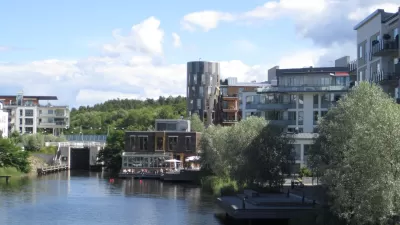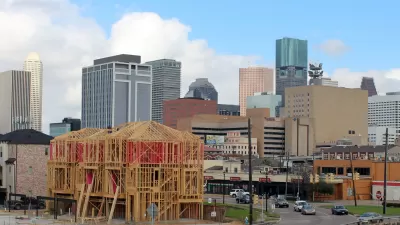Before San Diego adopts a proposal to continue redevelopment using profit-based concepts, it should pause to consider the perils, argues Murtaza H. Baxamusa, an affordable housing developer and planning professor.
California cities like San Diego are getting creative in their search for revenue sources to replace funding lost with the elimination of redevelopment programs.
However, Murtaza H. Baxamusa, an affordable housing developer and planning professor at the University of Southern California, argues that the public should be leery of funding efforts that attempt to mimic redevelopment.
"I am supportive of finding new ways to fund redevelopment that are proper and legal. However, absent clear community benefits standards, I am not sure if the public interest will be served by a property acquisition-income fund. There are several reasons to be wary of funding schemes guised as redevelopment."
Civic San Diego, a nonprofit consulting firm that works with the city of San Diego, recently adopted a funding acquisition program that involves leveraging a New Market Tax Credit (NMTC) to purchase properties and become landlords.
Baxamusa sees this push as a major concern because while redevelopment agencies were funded with public tax increment money, governed by elected officials, and regulated by state law, these new programs give private individuals a big role in decision making.
He goes on to highlight several questions posed by "pseudo redevelopment schemes."
"Our low-income urban neighborhoods are thirsting for investment, and they deserve better than a Wall Street scheme with little accountability."
FULL STORY: Beware of Wall Street Schemes on Redevelopment

Maui's Vacation Rental Debate Turns Ugly
Verbal attacks, misinformation campaigns and fistfights plague a high-stakes debate to convert thousands of vacation rentals into long-term housing.

Planetizen Federal Action Tracker
A weekly monitor of how Trump’s orders and actions are impacting planners and planning in America.

San Francisco Suspends Traffic Calming Amidst Record Deaths
Citing “a challenging fiscal landscape,” the city will cease the program on the heels of 42 traffic deaths, including 24 pedestrians.

Defunct Pittsburgh Power Plant to Become Residential Tower
A decommissioned steam heat plant will be redeveloped into almost 100 affordable housing units.

Trump Prompts Restructuring of Transportation Research Board in “Unprecedented Overreach”
The TRB has eliminated more than half of its committees including those focused on climate, equity, and cities.

Amtrak Rolls Out New Orleans to Alabama “Mardi Gras” Train
The new service will operate morning and evening departures between Mobile and New Orleans.
Urban Design for Planners 1: Software Tools
This six-course series explores essential urban design concepts using open source software and equips planners with the tools they need to participate fully in the urban design process.
Planning for Universal Design
Learn the tools for implementing Universal Design in planning regulations.
Heyer Gruel & Associates PA
JM Goldson LLC
Custer County Colorado
City of Camden Redevelopment Agency
City of Astoria
Transportation Research & Education Center (TREC) at Portland State University
Jefferson Parish Government
Camden Redevelopment Agency
City of Claremont




























